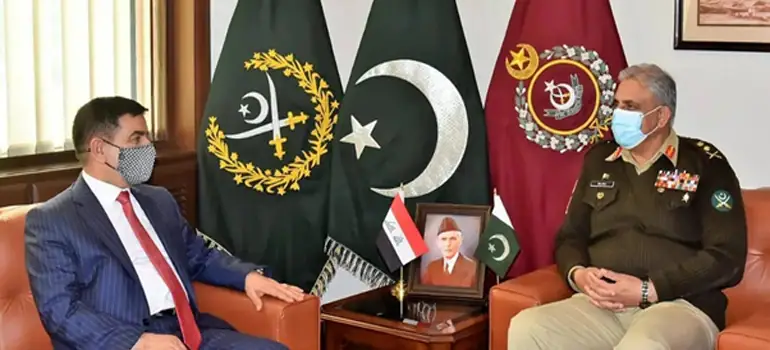
Pakistan’s Security and Defense
Pakistan, a South Asian country with nearly 220 million people, has long struggled with a variety of security and defense issues. It is an area of international strategic significance due to its geopolitical location, which borders China, India, Afghanistan, and Iran. This location has affected its security dynamics. This article explores the main facets of Pakistan’s security and defense environment, examining the difficulties it faces and the methods it uses to protect its interests Pakistan’s Security and Defense.
Historical Setting
The security issues Pakistan faces today have a long history. Pakistan was established as a distinct Muslim nation as a result of the partition of British India in 1947. The ongoing territorial issue over Kashmir, the subsequent Indo-Pak wars, and a complicated relationship with India have all been major causes of hostility. Pakistan’s security strategy is still influenced by these historical legacies Pakistan’s Security and Defense.
Concerns about internal security
- Terrorism:
Terrorism has been a problem for Pakistan for many years. Internal security has been severely hampered by the existence of extremist groups like the Taliban and other militant factions within its borders. To combat these challenges, the nation has begun military actions, particularly in the Federally Administered Tribal Areas (FATA).
- Balochistan Rebellion:
Ethnic Baloch parties have been fighting for more autonomy and a bigger share of the region’s natural resources for a long time in the province of Balochistan. this link. The domestic security of Pakistan and its relations with its neighbors have both been impacted by this insurgency.
- Advertisement -
Religious and Ethnic Conflicts
In areas like Karachi, where political and religious factions have clashed, there are also ethnic and sectarian tensions, which can result in bloodshed and instability.
Concerns about internal security
Terrorism:
Terrorism has been a problem for Pakistan for many years. Internal security has been severely hampered by the existence of extremist groups like the Taliban and other militant factions within its borders. To combat these challenges, the nation has begun military actions, particularly in the Federally Administered Tribal Areas (FATA).
Balochistan Rebellion:
Ethnic Baloch parties have been fighting for more autonomy and a bigger share of the region’s natural resources for a long time in the province of Balochistan. this JSTOR link. The domestic security of Pakistan and its relations with its neighbors have both been impacted by this insurgency. Pakistan’s Security and Defense.
Religious and Ethnic Conflicts
In areas like Karachi, where political and religious factions have clashed, there are also ethnic and sectarian tensions, which can result in bloodshed and instability.
Concerns about internal security
- Terrorism:
Terrorism has been a problem for Pakistan for many years. Internal security has been severely hampered by the existence of extremist groups like the Taliban and other militant factions within its borders. To combat these challenges, the nation has begun military actions, particularly in the Federally Administered Tribal Areas (FATA).
- Balochistan Rebellion:
Ethnic Baloch parties have been fighting for more autonomy and a bigger share of the region’s natural resources for a long time in the province of Balochistan. The domestic security of Pakistan and its relations with its neighbors have both been impacted by this insurgency.
Religious and Ethnic Conflicts
In areas like Karachi, where political and religious factions have clashed, there are also ethnic and sectarian tensions, which can result in bloodshed and instability.
- Defense Techniques:
Full Spectrum Deterrence: The cornerstone of Pakistan’s defense strategy is “Full Spectrum Deterrence.” By utilizing both conventional and nuclear threats, this policy seeks to dissuade aggression across the board in all potential war situations.
- Operations against Terrorism:
The military has engaged in a number of operations against terrorist organizations, destroying their infrastructure and focusing on their strongholds. Pakistan works with foreign partners to address security issues and looks for diplomatic solutions to local problems. Pakistan’s Security and Defense
Security and defense challenges
- India-related tensions:
India-related relations continue to be a major security problem. The two nations have participated in numerous wars and sporadic border skirmishes. Particularly, the current Kashmir dispute is still a sensitive subject.
- Extremism and Terrorism:
Despite tremendous progress in counterterrorism, terrorist elements continue to pose a threat in Pakistan. The intricate network of militant organizations present in the area necessitates ongoing watchfulness.
- Financial Restraints:
Due to its economic difficulties, Pakistan has limitations on its defense spending. It is a hard challenge to strike a balance between the requirement for military modernisation and economic progress.
Conclusion
Pakistan’s security and defense environment is complex and dynamic, influenced by past conflicts, current tensions in the region, and internal difficulties. It is still important to strike a balance between the necessity for military readiness and socioeconomic development. Pakistan’s security stance is greatly influenced by its nuclear deterrence and growing strategic alliances, especially with China. The nation’s dedication to stability and regional collaboration will be crucial in securing a safe future as it navigates these issues.

FAQs
What is Pakistan’s main security challenges, in your opinion?
A1: A number of security issues confront Pakistan, including as terrorism, hostilities with India, internal conflicts like the Balochistan insurgency, and disputes between ethnic and religious groups.
How important is Pakistan’s nuclear arsenal to its defense plan?
A 2: Pakistan views its nuclear arsenal as an essential aspect of its military strategy, with the main goal of preventing aggression, especially from India, its eastern neighbor.
How does the China-Pakistan Economic Corridor (CPEC) relate to security?
A3: CPEC is a significant infrastructure initiative that aims to link Pakistan’s Gwadar Port with China’s northwest area. Although it promises economic advantages, its proximity to regions where security is a problem, like Balochistan, creates security questions.
More Read Beautiful-place-of-chitral







